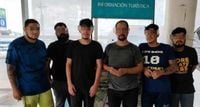Six men from Nayarit who vanished earlier this month in Chetumal, Quintana Roo, have been found alive after a harrowing ordeal that saw them forcibly taken, beaten, and held captive for 20 days. Their release, confirmed by the Fiscalía General del Estado de Quintana Roo and widely reported by local media, marks a bittersweet milestone in a case that has gripped two states and exposed the dark underbelly of labor exploitation and organized crime in Mexico’s southeast.
The men—Juan Antonio Ríos Quiroz (40), Veiko de Jesús Ruíz Verdín (29), Alexis Augusto Ibarra Cornejo (20), César Augusto Ahumada Montes (43), Emir Alonso Medina Ramos (25), and Isidro Castañeda Robles (35)—were discovered on September 23, 2025, at the ADO bus terminal, a bustling transit hub in the heart of Chetumal. According to the Fiscalía and corroborated by news outlets, the group bore visible injuries and bruises, clear evidence of the violence they endured during captivity. Medical evaluations conducted at the facilities of the Fiscalía General del Estado determined that, despite their ordeal, all six were in stable health.
Their disappearance dates back to September 3, 2025, when armed assailants stormed the Luna Caribe hotel and abducted the men at gunpoint. The incident immediately raised alarms, not only because of its brazen nature but also because it fit a troubling pattern of labor-related disappearances in the region. Families of the missing men, desperate for answers, reached out to advocacy groups like Madres Buscadoras de Quintana Roo, whose efforts helped ratchet up pressure on authorities to act swiftly.
Initial investigations, as reported by the Fiscalía and local press, revealed that the men had traveled from Nayarit to Quintana Roo in mid-July 2025. They were lured by promises of honest work in hotel maintenance and cleaning—a common enough story in Mexico’s tourist corridors. But the reality was far more sinister. Instead of legitimate employment, the men were coerced into working at a clandestine cigarette factory, producing and distributing illicit tobacco products. The recruitment, authorities say, was orchestrated by a Korean national who deceived the workers and then forced them into illegal labor.
“The victims arrived in Quintana Roo under the promise of jobs in maintenance and cleaning of hotels. However, more later, they were forced to work in a clandestine cigarette factory,” the Fiscalía stated, highlighting the calculated deception at the heart of the case. The men’s ordeal underscores the vulnerability of job seekers and the sophisticated operations of criminal networks preying on economic desperation.
According to reports, the six men were among a larger group of eleven individuals from Nayarit who were all abducted under similar circumstances. While the successful recovery of these six has brought some relief, the search continues for the remaining five, who are still missing. Authorities have not released their names but have assured the public that investigations are ongoing and that efforts are being redoubled to locate the missing and bring those responsible to justice.
The circumstances of the release were as dramatic as their disappearance. Early Tuesday morning, the six men were abandoned outside the ADO bus terminal. Terminal staff, noticing their battered condition, promptly alerted authorities. Security personnel and medical teams responded, transporting the men to the Fiscalía’s medical facilities for evaluation and care. “The six men presented clear signs of physical violence, and it is presumed that they were beaten during the time they were held captive,” reported local news sources, echoing the findings of the medical team.
Their rescue, while a testament to the perseverance of their families and the intervention of civil society groups, also exposes the persistent dangers facing migrant workers and the impunity enjoyed by human traffickers and criminal recruiters in Mexico. The case has reignited calls for greater oversight of labor recruitment practices, stronger protections for vulnerable workers, and more robust law enforcement action against those who exploit and endanger the lives of job seekers.
For the families of the freed men, the news brought a mix of relief and lingering anxiety. While their loved ones have returned alive, the trauma of their captivity—and the uncertainty surrounding the fate of the five still missing—remains. The Madres Buscadoras de Quintana Roo, whose advocacy proved crucial, have vowed to continue their search until all are accounted for. “We will not rest until all families are reunited,” a representative told reporters, urging authorities to maintain momentum and keep the public informed.
The investigation now turns to unraveling the network behind the illegal cigarette operation and the abductions. Authorities have identified a Korean man as the alleged recruiter, responsible for luring the victims under false pretenses and orchestrating their forced labor. Whether this individual acted alone or as part of a larger criminal enterprise is an open question, and one that investigators are keen to answer. Local officials have pledged to pursue all leads, emphasizing the need for cross-border cooperation and intelligence sharing to dismantle the networks that facilitate such crimes.
The Luna Caribe hotel, where the abductions occurred, has also come under scrutiny. Questions swirl about its role—if any—in the recruitment and subsequent disappearance of the Nayarit workers. The hotel industry in Quintana Roo, vital to the state’s economy, faces renewed pressure to vet contractors and recruitment agencies more rigorously, ensuring that similar deceptions do not occur in the future.
As the six men begin the slow process of recovery, their story serves as a stark reminder of the perils that can accompany the search for opportunity. Their ordeal, though harrowing, has shed light on the hidden dangers of labor exploitation and the resilience of those who fight for justice. For now, the families of the missing wait, clinging to hope that the next headline will bring news of another safe return.




